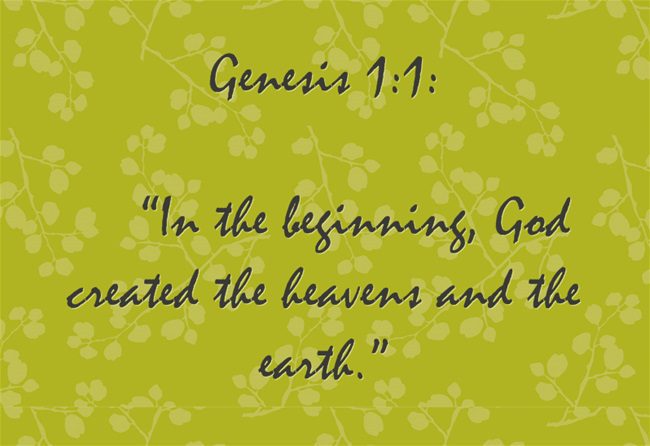The story of creation in Genesis has more to it than you might imagine. Discover how rich the creation story is as well as the Creator Himself.
Science and the Bible
The Bible is not so much a book about the heavens as much as it is about how to get there. There are some scientific facts but we cannot read the Bible like a textbook or science book. We must see God’s purpose and part of the purpose for the creation of the universe and mankind is to glorify God. David wrote in Psalm 19:1 that “The heavens declare the glory of God, and the sky above proclaims his handiwork.” It is interesting that the words “above” that follows the word “sky” is literally “the expanse.” Guess what? The universe is expanding. The heavens not only declare, or testify as evidence of God; they also declare or testify to His glory because if you look at the sheer size and enormity of it you must conclude that it is just amazing. We still haven’t seen the end of the universe, if indeed it has one.
As for mankind, we were created in God’s image (Gen 1:27, 31) and for His glory (Isaiah 43:7). The universe was not created for any other purpose but for God’s glory and when we understand that, we can look at the creation account in a different light. It was not written for scientists to explain the cause of the universe.
In the Beginning, God…
Scientists and physicists agree that everything there is fits into one of five categories and these categories are time, force, action, matter, and space and they all fit the description of the creation and can all be found in Genesis 1:1:
“In the beginning, God created the heavens and the earth.”
Let’s break it down with these five categories: In the beginning (that’s time), God (that’s force), created (that’s action), the heavens (that’s space), and the earth (that’s matter).
This is not written as a scientific description of the universe but it does give the five categories. It makes no qualms over Who the source of this creation was. No apologies, no hedging, just the fact as plain as can be.
God, the Unmoved Mover
The Greek Philosopher Aristotle sought to explain the existence of and the cause of the universe in a logical way. He called the cause the “unmoved mover” or the “prime mover.” This was his way of showing that the universe had a single causal reason or system which is explained through an examination of the notion of movement. The Greeks were the first to see that the earth was round, hundreds of years before this was discovered by others. He stressed the importance of how something can only be something else unless there was something that came before it. In other words, Aristotle concluded that logically, there must be a first unmoved mover in order to explain all other motion. In Aristotle’s Book Number Eight of Physics, he says “Motion cannot begin without the prior existence of something to impart motion in another thing, so that there will always be something in motion, since something at rest cannot cause motion in another thing. In addition, if motion were not eternal, then time would not have always existed, since time is the measure of motion” but according to Aristotle, “no one would be willing to say that time has not always been in existence” (8.1). Aristotle says it is impossible, in fact he strongly objects to the idea that motion had to be self-caused.
Another Reading: 5 Crucial Reasons Creationism Should Be Taught in Public Schools
Age of the Universe
The description of the creation in Genesis does not give a specific time period in the first few verses. It does not say that the heavens and the earth were created in one day. It simply says that God created it and that is enough for us to know. God either expects us to believe it or not. The words in Genesis 1:2 says that the “earth was without form and void; and darkness was upon the face of the deep.” The word for “form” as “without form” is “tohuw” which in Hebrew means formless, confusion, or emptiness. It’s like there was nothingness or empty space after the earth was created. The word “tohuw” can also mean wasteland or wilderness. The word used for void is “bohuw” which is close to the Hebrew word “tohuw” but “bohuw” means emptiness, void, and waste. So we could read Genesis 1:2a, which follows the description of the creation as “And the earth had no form or was formless and was a wasteland.” It was not until the Spirit of God, which is the name of the Third Person of the Trinity, the Holy Spirit, moved upon the face of the waters, which we can assume, sat on a formless, wasteland-like earth. The fact that everything material had a beginning forces us to conclude that everything had a cause and that cause was God and it was not random or blind chance. There must be a cause for every effect.
Moses the Author
There is every indication from biblical scholarship that Moses was the author of the Book of Genesis. As we know that all Scripture is God-breathed or inspired by the Holy Spirit (2 Tim 3:16) and the source of all Scripture is not of human origin and that no “Scripture comes from someone’s own interpretation, Moses wrote it but he was not the actual inspiration behind the words. The Bible is clear that “no prophecy (or writing) was ever produced by the will of man, but men spoke from God as they were carried along by the Holy Spirit” (2 Pet 1:20-21). Knowing that the only Scriptures at the time that Peter and the disciples had access to was the Old Testament, and this includes the Book of Genesis, the Book of Genesis had to also be written under the inspiration of the Holy Spirit and had no human origin and was not some manmade idea or human concoction.
Conclusion
What in the physical universe had no cause? Everything will pass away except the Word of God and God Himself Who had no beginning but also the souls of men and women, after they were created, will have no end (Matt 24:35; Luke 21:33). God created you, whether you believe it or not, for His glory just as He did the universe. If you believe in God then you can believe that He wants to save you (2 Pet 3:9). God receives no pleasure from an unsaved person perishing. Ezekiel writes “Have I any pleasure in the death of the wicked, declares the Lord God, and not rather that he should turn from his way and live? But when a righteous person turns away from his righteousness and does injustice and does the same abominations that the wicked person does, shall he live? None of the righteous deeds that he has done shall be remembered; for the treachery of which he is guilty and the sin he has committed, for them he shall die (Ezk 18:23-24) but if a wicked person turns away from all his sins that he has committed and keeps all my statutes and does what is just and right, he shall surely live; he shall not die. None of the transgressions that he has committed shall be remembered against him; for the righteousness that he has done he shall live” (Ezk 18:21-22).
Another Reading on Patheos to Check Out: What Did Jesus Really Look Like: A Look at the Bible Facts
 Article by Jack Wellman
Article by Jack Wellman
Jack Wellman is Pastor of the Mulvane Brethren church in Mulvane Kansas. Jack is also the Senior Writer at What Christians Want To Know whose mission is to equip, encourage, and energize Christians and to address questions about the believer’s daily walk with God and the Bible. You can follow Jack on Google Plus or check out his book Blind Chance or Intelligent Design available on Amazon












